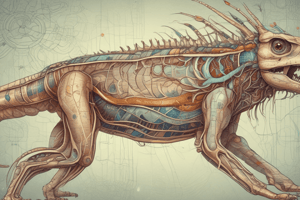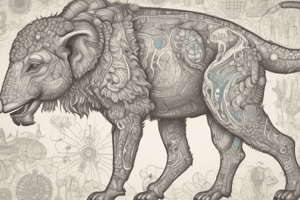Podcast
Questions and Answers
What is the primary focus of zoology?
What is the primary focus of zoology?
- Scientific study of animals (correct)
- Study of mineral compositions
- Study of geological formations
- Study of plants
Which branch of zoology focuses on the study of fish?
Which branch of zoology focuses on the study of fish?
- Ornithology
- Ichthyology (correct)
- Mammalogy
- Herpetology
What does the term 'taxonomy' refer to in zoology?
What does the term 'taxonomy' refer to in zoology?
- Examining evolutionary processes
- Researching animal physiology
- Study of animal behavior
- Science of naming and classifying organisms (correct)
Which of the following is NOT a method used in zoological research?
Which of the following is NOT a method used in zoological research?
In which major phylum would you classify insects?
In which major phylum would you classify insects?
What is the definition of adaptation in zoology?
What is the definition of adaptation in zoology?
Which current trend in zoology focuses on protecting endangered species?
Which current trend in zoology focuses on protecting endangered species?
Which concept in zoology describes the variety of life forms in a given ecosystem?
Which concept in zoology describes the variety of life forms in a given ecosystem?
Flashcards are hidden until you start studying
Study Notes
Overview of Zoology
- Definition: Zoology is the scientific study of animals, encompassing their biology, behavior, physiology, classification, and distribution.
- Branch of biology focused on understanding animal life.
Major Branches of Zoology
- Animal Physiology: Study of the functions and mechanisms of animal bodies.
- Animal Behavior (Ethology): Examination of animal actions and interactions.
- Entomology: Study of insects.
- Ornithology: Study of birds.
- Mammalogy: Study of mammals.
- Herpetology: Study of reptiles and amphibians.
- Ichthyology: Study of fish.
- Evolutionary Zoology: Study of the evolutionary processes that shape animal diversity.
- Comparative Anatomy: Comparison of anatomical structures across different species.
Key Concepts
- Classification: Organizing animals into hierarchical categories (kingdom, phylum, class, order, family, genus, species).
- Taxonomy: Science of naming and classifying organisms.
- Biodiversity: Variety of life forms in a given ecosystem or on Earth.
- Adaptation: Characteristics that enhance survival and reproduction in a specific environment.
- Ecology: Study of interactions between animals and their environments.
Animal Kingdom Classification
- Kingdom Animalia: Divided into several major phyla, including:
- Arthropoda (insects, arachnids, crustaceans)
- Chordata (vertebrates and some invertebrates)
- Mollusca (snails, clams, octopuses)
- Annelida (segmented worms)
Research Methods
- Field Studies: Observational research conducted in natural environments.
- Laboratory Studies: Controlled experiments to understand physiological and biological processes.
- Molecular Techniques: Use of genetics and molecular biology to study animal relationships and evolution.
Current Trends in Zoology
- Conservation efforts to protect endangered species and habitats.
- Impact of climate change on animal behavior and distribution.
- Advances in genetic research, including genomics and bioinformatics.
Importance of Zoology
- Understanding animal behavior and physiology aids in wildlife conservation.
- Knowledge of animal systems contributes to advancements in medicine and agriculture.
- Enhances appreciation of biodiversity and ecosystem health.
Overview of Zoology
- Zoology is the scientific exploration of animals, addressing their biology, behavior, physiology, taxonomy, and distribution.
- This branch of biology emphasizes a comprehensive understanding of animal life forms and their interactions within ecosystems.
Major Branches of Zoology
- Animal Physiology: Investigates the functional processes and bodily mechanisms of animals.
- Animal Behavior (Ethology): Focuses on studying animal actions, interactions, and communication patterns.
- Entomology: Concentrates on the study of insects, their life cycles, and ecological significance.
- Ornithology: Engages in the exploration of birds, including their anatomy, behavior, and conservation.
- Mammalogy: Examines mammals, their traits, and their roles within ecosystems.
- Herpetology: Dedicated to the study of reptiles and amphibians, including their biology and conservation challenges.
- Ichthyology: Studies fish, addressing their diversity, anatomy, and ecological importance.
- Evolutionary Zoology: Investigates the evolutionary processes that lead to animal diversity and adaptation.
- Comparative Anatomy: Analyzes structural similarities and differences among various animal species.
Key Concepts
- Classification: Involves organizing animals into a structured hierarchy (kingdom, phylum, class, order, family, genus, species).
- Taxonomy: A discipline centered on naming and categorizing organisms based on shared characteristics.
- Biodiversity: Refers to the variety and variability of life forms within a specific ecosystem or the entire planet.
- Adaptation: Encompasses traits that improve an organism's chances of survival and reproduction in its habitat.
- Ecology: Explores the relationships and interactions between animals and their environments.
Animal Kingdom Classification
- Kingdom Animalia is subdivided into several key phyla:
- Arthropoda: Encompasses insects, arachnids, and crustaceans, known for their exoskeletons and segmented bodies.
- Chordata: Includes vertebrates and some invertebrates, characterized by a notochord and dorsal nerve cord.
- Mollusca: Contains snails, clams, and octopuses, recognized for their soft bodies and often hard shells.
- Annelida: Comprises segmented worms, notable for their body segmentation and coelom.
Research Methods
- Field Studies: Involve collecting observational data in natural habitats to explore animal behaviors in situ.
- Laboratory Studies: Conduct controlled experiments to dissect and understand physiological and biological processes.
- Molecular Techniques: Utilize genetics and molecular biology to investigate animal relationships, evolutionary history, and genetic diversity.
Current Trends in Zoology
- Enhanced conservation efforts focus on protecting endangered species and their habitats.
- Research on climate change examines its effects on animal behavior and distribution patterns.
- Genetic advancements, including genomics and bioinformatics, are reshaping the understanding of animal evolution and relationships.
Importance of Zoology
- Helps in wildlife conservation by clarifying animal behavior patterns and physiological needs.
- Advances in medical and agricultural sciences stem from knowledge of animal biological systems.
- Fosters a deeper appreciation for biodiversity and the health of ecosystems.
Studying That Suits You
Use AI to generate personalized quizzes and flashcards to suit your learning preferences.




